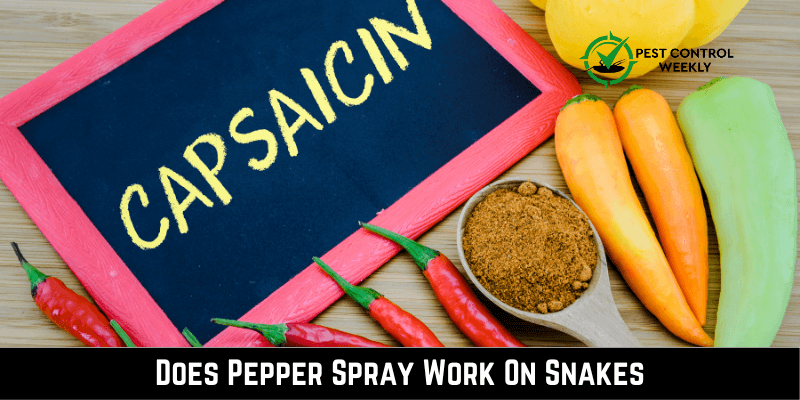Pepper spray is the most effective means of self-defense because it can deter would-be assailants with a mist of eye-watering capsaicin. But it can be used for more than just human safety. It can control wildlife, but does pepper spray work on snakes too?
No, pepper spray is not made for snakes, and it is not known if it works on them. Use a snake repellent designed for use on snakes, or just stay away from them entirely.
In this article, we’ll talk about how pepper spray works, how it might affect snakes, and other ways to deal with these curious animals.
How Does Pepper Spray Affect Snakes?
Snakes are cold-blooded, so they rely on their senses to find their way around and find food. The pit organ, which is sensitive to heat, is an essential part of their sense system because it lets them notice changes in temperature in their surroundings. Below is the way pepper spray affects snakes:
The Active Ingredient in Pepper Spray: Capsaicin

The main ingredient in pepper spray is capsaicin, which comes from the spicy chemicals in chili peppers. This strong material is naturally spicy, which is the main reason why it burns when it comes in contact with the skin of a snake. Capsaicin is effective in self-defense since it has a high Scoville scale rating. Further, this high potency has piqued the interest of scientists and nature lovers who wish to learn how it affects snakes.
Capsaicin’s Impact On Snakes
When it comes to snakes, the effects of capsaicin are more complex than one might think. Snakes’ sensory organs help them sense their environment as ectothermic animals. These reptiles can detect prey’s thermal signals via their pit organ, a heat-sensitive structure between the eye and nose.

But this pit organ is not the main target of capsaicin. Instead, it targets the snake’s trigeminal nerve, which sends sensory information from its face to its brain. When a snake is exposed to capsaicin, the trigeminal nerve becomes slightly overloaded. This makes it hard for the snake to take in and process information. Even though capsaicin may confuse and make snakes uncomfortable, it is still unclear how well it works as a barrier.
Other Methods To Deter Snakes
Natural Snake Repellents
According to Int. J. Plant Anim. Environ. Sci., these snake repellents are safe for the earth and other living things because they use the power of nature. A few of these methods are described below:
- Cultivating aromatic plants with strong odors can be a natural barrier that lures away snakes. Marigolds, lemongrass, and wormwood are all examples of plants that give off smells that snakes don’t like.
- Essential oils from clove, cinnamon, and eucalyptus can keep snakes away from your property’s border. Snakes don’t like how these concentrated oils smell, so they stay away.
- Diatomaceous Earth is a natural solid rock of fossilized diatoms that can be used to keep snakes away. Snakes avoid places where diatomaceous earth is spread because its rough material irritates their sensitive skin.
- Indirectly, the use of beneficial nematodes can help with snake population control. These tiny worms eat insects and bug eggs, which are food for many snakes. By making it harder for snakes to find food, the worms make the place less appealing.
- Reducing snake populations can be as simple as making the local environment less welcoming. This may include cleaning up, mowing the yard, and sealing building entrances. These changes make it harder for snakes to hide and stop them from coming to the land.
- Natural predators, such as birds of prey or mongooses, can help keep snake populations in check and the ecology in balance. A powerful, natural way to get rid of snakes is to build breeding boxes for birds of prey or create an environment that attracts these animals.
Mechanical and Physical Deterrents
In addition to natural remedies, there are also several mechanical and physical ways to keep snakes from coming near people. Some of these strategies are explained below:
- A snake-proof fence can be built around the perimeter to prevent snakes from entering the property. A good fence has fine wire or solid materials, a smooth surface, and a hidden base to stop snakes from digging under it.
- Snake traps are an effective and humane way to get rid of snakes and other unwanted guests. Live traps, like funnels or box traps, lure snakes into a space from which they can’t get out. This allows the snakes to be moved to a better place to live.
- Creating a gravel bed around the perimeter can discourage snakes from entering a property. The gravel’s uneven and abrasive surface makes it unpleasant for snakes to walk on. Because of this physical barrier, snakes are more likely to look for other ways to get around and avoid the marked area.
- The effectiveness of ultrasonic deterrents is debatable. However, some believe they can prevent snakes from entering a property by creating vibrations that annoy or confuse them. But more study is needed to prove they are good at keeping snakes away.
- Snakes can be kept out of structures by installing exclusion devices such as vent covers, door sweeps, and wire mesh screens over entry points. Ensuring all holes and cracks are covered makes a snake less likely to get in.
- Prey animals, such as rodents and insects, thrive in moist areas. Therefore, this is why moisture control is essential. Taking steps to control wetness, like fixing leaks and improving drainage systems, can make conditions less appealing to snakes and keep them away.
Chemical Snake Repellents
According to the University of Pretoria, chemical snake repellents are an alternative to natural, mechanical, and physical ways to avoid snakes. Most of the time, these chemicals use strong molecules made in a lab to create an environment where snakes can’t live. Here are a few vital chemical snake repellents:
- Naphthalene is a solid chemical that comes from coal tar or crude oil. It has a strong smell and is often used in snake repellents. Its powerful odor is said to impair snakes’ olfactory systems, making the habitat less desirable. But the usefulness of naphthalene as a snake repellent is still up for question, and it should be used with care because it could harm people, pets, and the environment.
- Sulfur is a naturally occurring element that has a strong, unpleasant smell. It is often used in snake repellents. It is thought that the smell of sulfur can bother snakes’ sensitive chemosensory systems, making them stay away from the treated area. Sulfur-based repellents don’t always work, and their strong smell may also put people off.
- Many snake repellents on the market use unique mixtures of chemicals to keep snakes away. These items often have things like essential oils, naphthalene, or sulfur that are supposed to make snakes uncomfortable. The success of commercial repellents can vary, depending on the formula, the snake species being repelled, and how often the repellent is used.
- Another chemical strategy is to employ rodenticides to reduce snake populations indirectly. By cutting down on the number of mice, the primary food source for many snake species, the area becomes less appealing to snakes. But rodenticides can have unexpected effects on non-target species and the environment, so their use must be carefully considered.
Safe Ways To Handle Snake Encounters
When you come across a snake by accident, it’s most important to keep yourself safe and stay calm. By following a set of smart rules, people can deal with snakes and other reptiles without putting themselves or the snakes in danger. The safest ways to deal with snakes are described in the following suggestions:
Observe From a Safe Distance
Once you’ve found a snake, it’s important to keep a safe distance, ideally at least twice the length of the snake’s body. This precaution makes it less likely that the creature will see the viewer as a danger, which lowers the chance that it will act defensively.
Stay Calm And Collected
When you see a snake, it’s important to stay calm and collected. Sudden movements or fear may agitate the reptile, worsening the situation. Instead, take slow, deep breaths and stay calm while you look at the situation.
Refrain From Interacting
Don’t get too close to the snake, touch it, or do anything that might make it angry. Snakes are more likely to run away from something they think is dangerous, so giving them a clear path to safety can help bring a peaceful answer.
Figure Out The Species
If you can, carefully determine the snake’s species to see if it is a deadly threat. In these cases, it can be very helpful to know the local snake types and how to tell them apart. But be careful and make keeping a safe distance the most important thing.
Seek Professional Help
If a snake has gotten into your home or could be dangerous, it is best to call a professional wildlife expert or snake catcher. These experts have the skills and tools to remove and put the snake elsewhere.
Educate and inform
Talking to family, friends, and neighbors about snake behavior, how to tell a snake apart, and how to stay safe can help everyone be better prepared for future experiences. Education is a strong way to help people live in peace with these often misunderstood animals.
The Effects Of Pepper Spray On Humans And Animals
Pepper spray, a powerful self-defense weapon, affects people and animals. Its effectiveness comes from capsaicin, a chili pepper component that burns on contact. Pepper spray causes several physiological reactions in humans and animals:
- The effects on humans include a burning feeling in the eyes, skin, and mucous membranes; tears; temporary blindness; trouble breathing; coughing; a runny nose; anxiety; disorientation; and panic.
- Mammals (dogs, bears) respond similarly to humans, experiencing acute irritation and brief incapacitation; usage is restricted to self-defense.
- The birds have an exceptional tolerance to capsaicin, so they can eat chili peppers without pain and help spread the seeds of the plants they eat.
- Effects on aquatic life are mostly unknown but may cause discomfort and distress.
- To reduce the risk of injury to people and animals, pepper spray must be used responsibly.
Final Thoughts
In conclusion, pepper spray may have some effect on snakes, but there isn’t enough scientific proof to say for sure, and there are social questions about how it should be used. Instead, we should focus on ways that are kind to animals and good for the environment, like natural repellents, mechanical barriers, and changing their habitats. This will help us live in peace with snakes.
By following these rules and teaching ourselves and others, we can keep our world’s environment healthy and in balance, which is good for both people and the many other animals that live here.
FAQs
References
